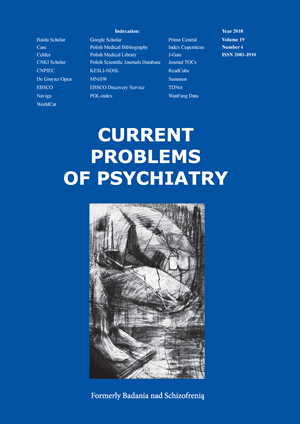Positive interventions in the therapy of schizophrenia patients
DOI:
https://doi.org/10.2478/cpp-2018-0018Keywords:
positive psychotherapy, methods, schizophreniaAbstract
Positive psychology directs its research interests primarily to healthy people. The most important goal is to build a positive attitude towards yourself and the surrounding world. Recently, positive psychology has set a new area of research interest, which is clinical psychology. In recent years, several positive psychotherapy programs have been developed for people with schizophrenia experience. The article presents the latest trends in positive psychotherapy for people with schizophrenia. They involve taking into account the individual differences of each patient and the specificity of his/her psychopathology. As far as the therapeutic goals are concerned, there are interventions focused on strategies for enhancing positive emotions and wellbeing or the method of activating the strengths of character. Taking into account the methods of therapeutic work, they can be divided into training methods or those of the behavioral-cognitive psychotherapy as well as those that take into account the various aspects of meditation. The article presents the distribution of therapeutic programs in terms of the range of therapeutic goals in which the most important are: intensification of positive experiences, building of strengths of character and well-being. Therapeutic programs have been shown to focus not only on breaking down negative attitudes towards one's own illness and life, but also on those that try to deal with the unsolved schizophrenia problem - negative symptoms.
References
1. Wood AM, Maltby J, Gillett R, Linley PA, Joseph S. The role of gratitude in the development of social suport, stress and depression: two longitudinal studies. Journal of Research in Personality. 2008; 42: 854-871.
2. Pietrowsky R. Effects of positive psychology interventions in depressive patients? A randomized control study. Psychology. 2012; 3: 1067-1073.
3. Gilman R, Schumm JA, Chard KM. Hope as a change mechanism in the treatment of posttraumatic stress disorder. Psychological Trauma: Theory, Research, Practice and Policy. 2012; 4: 270-277.
4. Akhtar M, Boniwell I. Applying positive psychology to alcoholmisusing adolescents: A group interwention.Groupwork: An Interdisciplinary Journal for Working with Groups. 2010; 20: 6-31.
5. Murray G, Johnson SL. The clinical significance of creativity in bipolar disorder. Clinical Psychology Review. 2010; 30: 721-732.
6. Evans J. Positive psychology and brain injury rehabilitation. Brain Impairment. 2011; 12: 117-127.
7. Kashdan TB, Julian T, Merritt K, Uswatte G. Social anxiety and posttraumatic stress in combat veterans: Relations to well-being and character strengths. Behaviour Research and Therapy. 2006; 44: 561-583.
8. Al-Krenawi A, Elbedour S, Parsons JE, Onwuegbuzie A, Bart WM, Ferguson A. Trauma and war: Positive psychology/strengths approach. Arab Journal of Psychiatry. 2011; 22: 103-112.
9. Rashid T. Positive psychotherapy : A strength-based approach. The Journal of Positive Psychology. 2015; 10 (1): 25-40.
10. Fredrickson BL. The role of positive emotions in positive psychology: The broaden-and-build theory of positive emotions. American Psychologist. 2001; 56: 218-226.
11. Cohen S, Doyle WJ, Turner RB, Alper CM, Skoner DP. Emotional style and susceptibility to the common cold. Psychosomatic Medicine. 2003; 65: 652-657.
12. Fredrickson BL, Mancuso RA, Branigan C, Tugade MM. The undoing effect of positive emotions. Motivation & Emotion. 2000; 24: 237-258.
13. Meyer PS, Johnson DP, Parks A, Iwansky C, Penn DL. Positive living: a pilot study pf group positive psychotherapy for people with schizophrenia. The Journal of Positive Psychology. 2012; 7: 239-248.
14. Favrod J, Nguygen A, Franchauser C, Ismailaj C, Hasler JD, Ringuet A, Rexhais S, Bonsack H. Positive Emotions Program for Schizophrenia (PEPS): a pilot intervention to reduce anhedonia and apathy. BMC Psychiatry. 2015.
15. Nguyen A, Frobert L, McCluskey I, Golay P, Bonsack C and Favrod J (2016) Development of the Positive Emotions Program for Schizophrenia: An Intervention to Improve Pleasure and Motivation in Schizophrenia. Front. Psychiatry. 2016; 7(13): 1-9.
16. Vauth R, Stieglitz RD. Trening inteligencji emocjonalnej w schizofrenii. Warszawa: Wydawnictwo DK Media Poland; 2014.
17. Sims A, Barker C, Price C, Fornells-Ambrojo. Psychological impact of identifying character strengths in people with psychosis. Psychosis. 2015; 3: 7(2): 179-182.
18. Johnson DP, Penn DL, Fredrickson BL, Kring AM, Meyer PS, Lahnna I, Brantley M. A pilot study of loving-kindness meditation for negative symptoms of schizophrenia. Schizophrenia Research. 2011; 129: 137-140.
19. Johnson D P, PennDL, Fredrickson BL, Meyer PS, Kring AM, Brantley M. Loving – kindness meditation on enhance recovery from negative symptoms of schizophrenia. Journal of Clinical Psychology. 2009; 65: 499-509.
20. Schranc B, Bird V, Tylee A, Coggins T, Rashid T, Slade M. Conceptualising and measuring the well-being of people with psychosis: systematic review and narrative synthesis. Social Science & Medicine. 2013; 92: 9-21.
21. Schranc B, Riches S, Coggins T, Raschid T, Tylee A, Slade M. WELLFOCUS PPT- modified positive psychotherapy to improve well-being in psychosis: study protocol for a pilot randomised controlled trial. Trials. 2014; 15 (1): 203.
22. Schranc B, Riches S, Coggins T, Tylee A, Slade M. From objectivity to subjectivity: conceptualisation and measurement of well-being in mental health. Neuropsychiatry. 2013; 3: 525-534.
23. Leamy M, Bird V, Le Boutillier C, Williams J, Slade M. A conceptual framework for personal recovery in mental health: systematic review and narrative synthesis. British Journal of Psychiatry. 2011; 199: 445-452.
24. McNulty JK, Fincham FD. Beyond positive psychology? Toward a contextual view of psychological prosses and well-being. American Psychologist. 2012; 67: 101-110.
Downloads
Published
Issue
Section
License
Copyright (c) 2018 Authors

This work is licensed under a Creative Commons Attribution-NonCommercial-NoDerivatives 3.0 Unported License.


